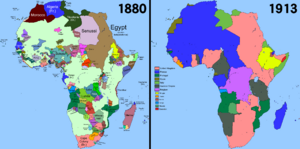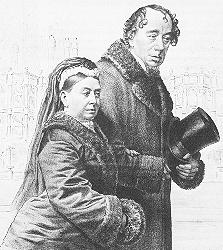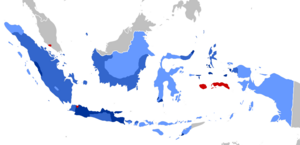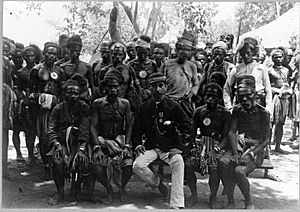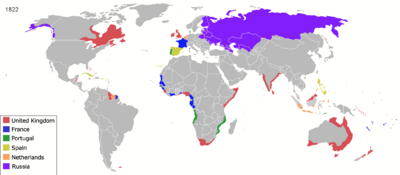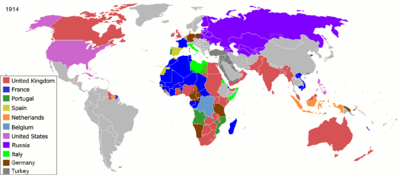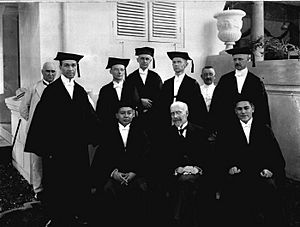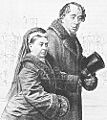New Imperialism facts for kids
New Imperialism was a time in history when powerful countries, mostly in Europe, but also the United States and Japan, took control of lands far away. This happened in the late 1800s and early 1900s.
During this period, these countries wanted to build big empires. They used new technologies to conquer lands and take their natural resources. They also wanted to find new markets to sell their goods. Many people believed they were helping "civilize" the people in these new lands.
The Western powers and Japan took over almost all of Africa and parts of Asia. Many of these colonies later became independent after World War II. The word "new" helps us tell this period apart from older times when empires were built, like ancient empires or the first wave of European colonization.
Contents
Why New Imperialism Started
The first wave of European imperialism ended around the 1820s. This was after the American colonies fought for their freedom and the Spanish Empire in Latin America broke apart. In Great Britain, these events showed that the old way of thinking about trade, called mercantilism, wasn't working well. Mercantilism meant countries competed for a limited amount of wealth.
Britain then started to believe in free trade, where countries could trade more openly. This helped their factories grow. For a while, Britain was the strongest military and economic power in Europe. They made goods so well that they could sell them cheaper than others in many countries.
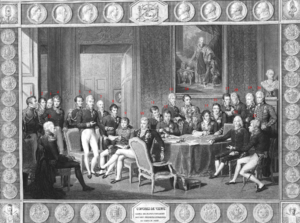
But after 1871, other countries like Germany and Italy became stronger. France also wanted to get back land that Germany had taken. This led to a very unstable peace in Europe. Countries started protecting their own industries, moving away from free trade.
The Berlin Conference
The Berlin Conference happened in 1884–1885. Its goal was to reduce fighting between European powers over land in Africa. They decided that to claim a territory, a country had to actually control it. This often meant using military force against local people. Uprisings were put down harshly.
Fifteen nations attended the conference, but no African countries were there. The main powers were France, Germany, Great Britain, and Portugal. They redrew the map of Africa, ignoring the existing cultural and language borders. Africa was divided into 50 different colonies. The countries also talked about ending the slave trade in Africa, but they didn't make strong promises.
Britain's Role
New Imperialism brought big economic changes for Britain. Britain was ahead in technology for a long time because it was the first to industrialize. But by the late 1800s, Germany and the United States started catching up.
Britain's share of world manufacturing dropped from 31.8% in 1870 to 14.7% in 1910. The U.S. and Germany grew stronger. As other countries became more involved in imperialism, Britain struggled to keep its lead in trade and investments.
In the early 1900s, Britain also faced challenges from Japan, Germany, and Italy. Britain worried that Japan might threaten its lands in Asia and Australia. Italy was interested in North Africa, which worried Britain about Egypt. Germany's power in Europe also concerned Britain. To protect its empire, Britain tried a policy of giving in to some demands, known as appeasement.
Most people in Britain thought that if imperialism was going to happen, Britain should lead it. They believed British imperialism was a good thing for the world. Even in 1940, some groups argued that Africa should stay with the British Empire until it could develop on its own. The poet Rudyard Kipling wrote about how British people involved in imperialism knew more about their country's identity. There was little opposition to imperialism in Britain at this time.
How Society Changed
New Imperialism changed how people viewed colonization. Rudyard Kipling wrote about the "White Man's Burden". This idea suggested that Europeans had a duty to bring their way of life to other parts of the world, even if those people didn't want it.
Take up the White Man's burden—
In patience to abide,
To veil the threat of terror
And check the show of pride;
By open speech and simple,
An hundred times made plain
To seek another's profit,
And work another's gain.
This poem shows how Britain saw its role in colonizing other countries. While some believed they were helping, imperialism often led to negative results. Governments became more controlling, and military spending increased. It also created corrupt leaders in the colonies and sometimes led to racism and xenophobia.
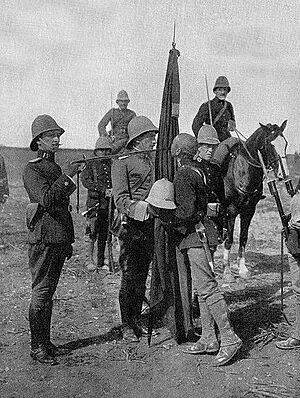
Many powerful people in Europe supported expanding empires. Business owners wanted to protect their investments overseas. Government officials wanted more power. Military officers wanted promotions. These groups helped keep empire building going.
Some leaders also used imperialism to unite their own people. They promoted strong national pride, called jingoism, to distract from problems at home. This was seen in wars like the Spanish–American War and the Boxer Rebellion.
Even some socialist groups, who usually opposed oppression, thought that European governments should guide colonial peoples towards independence.
Asia
India
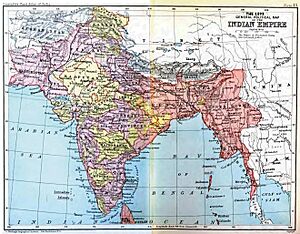
In the 1600s, British traders came to India and formed the East India Company. This company slowly took control of most of India between 1757 and 1849. They took advantage of the weakening Mughal Empire. New inventions like clipper ships made the trip to India much faster.
By 1818, the British controlled most of India. They started changing laws and imposing new taxes. They also controlled industries. In 1857, some Indian soldiers, called sepoys, rebelled in the Indian Rebellion. After Britain stopped the rebellion, India came under the direct control of the British crown.
The British changed India's economy. Before, Europe paid for Indian goods with gold. Now, Britain made Indian farmers grow crops like cotton for export. India also became a market for British factory-made goods. The British also collected high taxes on salt.
The British built railroads and telegraph lines to connect Indian cities. They also built irrigation systems for farming. When Western education came to India, many Indians learned from it. But they also saw the unfair treatment from the British. This led to the creation of the Indian National Congress, which asked for equal treatment and self-governance.
In 1876, Queen Victoria was declared Empress of India. The British government continued to control many industries, like salt production.
Southeast Asia
After India, the British expanded into Burma, Malaya, Singapore, and Borneo. These places provided more trade and raw materials for Britain. The United States took control of the Philippines after the Philippine–American War.
Indonesia
The Dutch East Indies (now Indonesia) became a formal colony in the early 1800s. Before that, the Dutch East India Company (VOC) was mainly a trading company. The Dutch slowly took control of most of the islands.
The Dutch East Indies became a very valuable colony for the Dutch Empire. It wasn't a place where many Dutch people moved to live. Instead, the Dutch controlled the large local populations by working with existing local rulers. They used military force to support this control.
In 1869, a British explorer named Alfred Russel Wallace described how the Dutch governed. They kept local rulers in place, but a Dutch official, called a Resident, would give "recommendations" that had to be obeyed.
Indochina
France took over all of Vietnam and Cambodia in the 1880s. Then, they added Laos to their Indochinese empire. This left the kingdom of Siam (now Thailand) as a neutral country between British and French lands.
East Asia
China
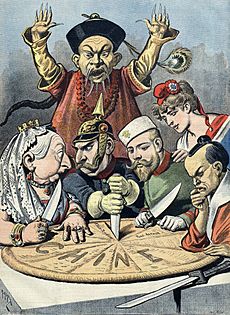
In 1839, China fought the First Opium War with Great Britain. China lost and had to sign the Treaty of Nanking in 1842. This treaty gave Hong Kong Island to Britain and opened several ports, like Shanghai, for British trade. Another war, the Second Opium War, broke out in 1856. China lost again and had to open more ports and allow foreigners to travel inside the country. Missionaries also gained the right to spread Christianity.
By the late 1800s, China seemed like it would be divided up by foreign powers. These treaties made the Chinese feel very bitter and humiliated. For example, Westerners accused of crimes in China would be tried under their own country's laws, not Chinese laws.
In 1904, the British went into Lhasa, Tibet. They were worried about Russia's influence there. China was weak due to natural disasters and rebellions. Japan and the European powers easily took control of trade and land.
However, China did try to modernize its military in the late 1800s, buying and making modern weapons. Some historians say that China's weakness was mostly at sea, not on land.
The rise of Japan as an imperial power after the Meiji Restoration also led to China's problems. In 1895, China lost a war with Japan and had to give Taiwan to Japan.
In 1897, Germany took advantage of the murder of two missionaries to demand mining and railroad rights in Shandong province. In 1898, Russia gained access to Dairen and Port Arthur and the right to build a railroad across Manchuria. Britain, France, and Japan also got special rights.
This loss of Chinese control led to the Boxer Rebellion in 1900. Chinese "Boxers" attacked foreign areas in Beijing. Several foreign powers formed an alliance and sent troops to Beijing, looting and occupying the city. Russia strengthened its control over Manchuria until Japan defeated them in the Russo-Japanese War of 1904–1905.
Foreign control over parts of China finally ended in 1997 and 1999 when Hong Kong and Macau became part of the People's Republic of China. Chinese historians call this period the "century of humiliation".
Central Asia
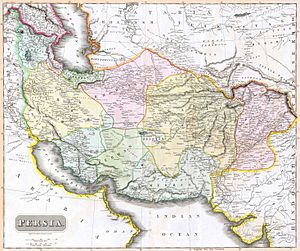
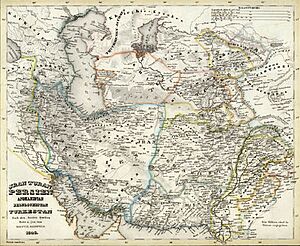
"The Great Game" was a long-running competition between the British Empire and the Russian Empire for control and influence in Central Asia. This rivalry mostly involved Afghanistan, Persia (now Iran), and the Central Asian states. It lasted from about 1813 until 1907.
Africa
The Scramble for Africa
Between 1850 and 1914, Britain took control of almost 30% of Africa's population. France controlled 15%, Germany 9%, Belgium 7%, and Italy 1%. Only Liberia and Ethiopia remained independent by 1914.
British Colonies
Britain took over Egypt in 1882 to protect the Suez Canal. This led them to conquer Sudan in 1896–1898. In 1899, Britain completed its takeover of what would become South Africa, which they had started in 1814. They invaded the gold-rich republics of Transvaal and the Orange Free State. The British South Africa Company had already taken land to the north, naming it Rhodesia.
Cecil Rhodes, a British leader, dreamed of a "Cape to Cairo" empire, linked by rail. This would connect the Suez Canal to the rich mineral areas in the south. However, Belgium and Germany controlled lands in between, stopping this plan until after World War I.
Britain's search for diamonds in southern Africa led to problems. White and black South Africans were hired for jobs, but white South Africans got better-paying and safer jobs. Black South Africans risked their lives in the mines for less pay. This unfair treatment was the start of segregation that lasted until 1990.
Even though Britain supported free trade, it ended up with the largest overseas empire by 1914. This was thanks to its long presence in India and its gains in Africa.
Congo Free State
Before 1876, Belgium had no colonies in Africa. Then, King Leopold II created the International African Society. It seemed like a scientific group, but it was actually Leopold's private company. He hired Henry Morton Stanley to explore and claim the Congo River area. This region had many resources like ivory, rubber, diamonds, and metals. Stanley made treaties with over 450 local tribes, gaining over 905,000 square miles of land for Leopold.
The Belgian government and people were not interested in imperialism. So, the land became King Leopold II's personal property. At the Berlin Conference in 1884, he was allowed to have the land, called the Congo Free State. Other European countries agreed, but only if he stopped the slave trade, promoted good treatment of people, allowed free trade, and encouraged Christian missions.
However, Leopold II mainly wanted to make a lot of money from ivory and rubber. He made cruel rules that led to many deaths. He forced local people to collect rubber and ivory without pay. Their families were held hostage until they met their quotas. If they failed, their families could be killed. Villages that refused were burned. It is estimated that as many as 10 million people died from violence, hunger, and disease.
Leopold II made huge profits. He used propaganda to hide his actions from other European nations. For example, he had Congolese pygmies perform at a World Fair to show he was "civilizing" them. Because of strong international pressure, the Belgian government took control of the territory in 1908 and renamed it the Belgian Congo. The human rights abuses in the Congo Free State are considered some of the worst during New Imperialism.
Oceania
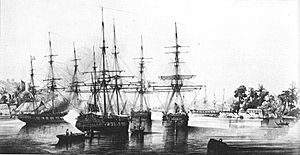
France became a major imperial power in the Pacific. They made Tahiti and New Caledonia protectorates in 1842 and 1853. Tahiti was fully taken over by France in 1880.
The United States also gained land in this period. They took over Hawaii and most of Spain's colonies after the 1898 Spanish–American War. They also divided the Samoan Islands with Germany.
By 1900, most Pacific islands were controlled by Britain, France, the United States, Germany, and Japan.
Chile's Expansion
Chile also became interested in expanding into the Pacific islands. This idea started in the 1830s. In 1851, Chile officially organized the Juan Fernández Islands. Chile's ships also created a trade route between California and Australia. By 1861, Chile had a profitable trade network across the Pacific.
After winning the War of the Pacific, Chile's navy became very strong. Its port of Valparaíso became very important. In 1886, Captain Policarpo Toro suggested that Chile take over Easter Island. President José Manuel Balmaceda supported this idea because the island was in a good location and had economic value. In 1888, Easter Island officially became part of Chile. By doing this, Chile joined the imperial nations.
Imperial Rivalries
The expansion of European control in Africa and Asia made the rivalries between countries even stronger before World War I. When France took Tunisia in 1881, it caused tension with Italy. Britain's takeover of Egypt a year later also made relations with France worse.
The biggest conflicts were the Spanish–American War of 1898 and the Russo-Japanese War of 1904–05. These wars showed that new imperial powers, the United States and Japan, were rising. The Fashoda Crisis in 1898 was a serious conflict between Britain and France, but France backed down. This helped improve relations between them.
Britain's actions in South Africa and Germany's actions in Asia led to big changes in alliances. In the 1900s, Britain allied with Japan, and then with France and Russia in the Triple Entente. Germany tried to break this alliance by challenging France in Morocco, leading to crises in 1905 and 1911. These events increased tension before World War I.
Why Countries Wanted Colonies
Helping Others
One big reason for New Imperialism was the idea of "humanitarianism" and "civilizing" people in Africa and other less developed places. For many Christian missionaries, this was a religious goal to "save the souls" of "uncivilized" people. They believed their religion was the only true one. Sometimes, missionaries did help by stopping slavery in some areas. Europeans often claimed they were there to protect weaker groups. While some imperialists truly wanted to help, their choices were not always best for the local people.
Dutch Ethical Policy
The Dutch Ethical Policy was a new way of governing the Dutch East Indies (Indonesia) in the 1900s. In 1901, Queen Wilhelmina said that the Netherlands had a duty to help their colonial subjects. This was different from the old idea that the colony was just for making money.
The policy focused on improving living conditions. However, it didn't get enough money and faced resistance from Dutch officials. It mostly ended by 1929. But it did create a group of educated local leaders who eventually helped Indonesia gain independence.
Timeline
- 1833: Britain took over the Falkland Islands.
- 1839: Britain conquered Aden.
- 1841: Britain created the Colony of New Zealand.
- 1842: Britain received Hong Kong Island from China.
- 1849: Britain took over the Sikh Empire in Punjab.
- 1853: France took over New Caledonia.
- 1857: Britain stopped the Indian Rebellion.
- 1862: France created French Cochinchina.
- 1867: United States bought Alaska from Russia.
- 1874: Britain created the Colony of Fiji.
- 1881: France took over Tunisia.
- 1882: Britain occupied Egypt.
- 1885: Britain completed the conquest of Myanmar. The Belgian king created the Congo Free State.
- 1888: Chile took over Easter Island.
- 1895: China gave Taiwan to Japan.
- 1897: France took over Madagascar.
- 1898: United States took over Hawaii, Puerto Rico, Cuba, Guam, and the Philippines.
- 1910: Japan took over the Korean Empire.
Images for kids
-
British Prime Minister Benjamin Disraeli and Queen Victoria
 In Spanish: Nuevo imperialismo para niños
In Spanish: Nuevo imperialismo para niños
See Also
- Imperialism
- Timeline of European imperialism
- Imperialism in Asia
People to Know
- Otto von Bismarck, Germany
- Joseph Chamberlain, Britain
- Jules Ferry, France
- William McKinley, United States
- Emperor Meiji, Japan
 | Delilah Pierce |
 | Gordon Parks |
 | Augusta Savage |
 | Charles Ethan Porter |


